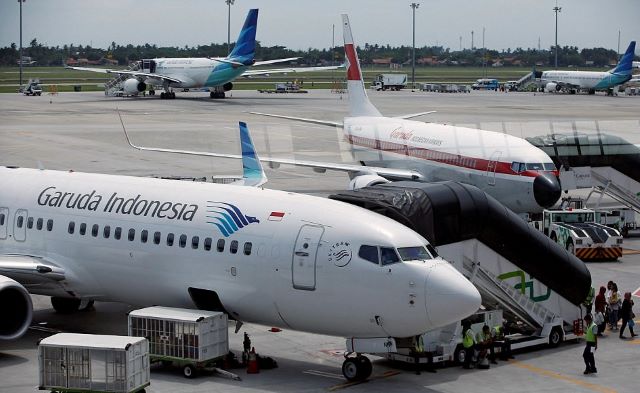Per 1 Juli, Ribuan WNA Berbondong-bondong Tinggalkan RI
Thousands of Foreigners Leave Indonesia Amid COVID-19 Crisis
Editor : Kemal A Praghotsa
Translator : Novita Cahyadi

RIBUAN warga negara asing [WNA] telah meninggalkan Indonesia untuk kembali ke negara asalnya dalam beberapa pekan terakhir, tampaknya didorong oleh gelombang pandemi Covid-19 yang semakin tinggi di tanah air.
Fenomena WNA eksodus sudah terjadi sejak awal bulan Juli, sekitar 16.000 WNA telah keluar dari RI, berdasarkan data dari Imigrasi Kelas I Khusus Tempat Pemeriksaan Imigrasi [TPI] Bandar Udara Soekarno-Hatta.
"Eksodus meningkat secara signifikan dalam tiga hari terakhir saja, dan untuk alasan kepergian kami tak mengetahui," kata Kabid Tikim Imigrasi Bandara Soekarno-Hatta Sam Fernando kepada Associated Press.
Duta Besar Jepang untuk RI, Kenji Kasanugi, mengatakan suliltnya mendapatkan vaksin bagi warga negara asing telah mendorong beberapa warga Jepang untuk mendapatkan vaksinasi di negara asalnya.
“Di tengah situasi pandemi yang sangat menyulitkan kita semua, beberapa warga negara Jepang di Indonesia untuk sementara akan kembali ke Jepang,” kata Kanasugi dikutip dari Instagram miliknya.
Warga negara Jepang dan China merupakan bagian terbesar dari keberangkatan, dengan masing-masing 2.962 dan 2.219 orang, diikuti oleh 1.616 warga negara Korea Selatan. Angka bandara juga menunjukkan keberangkatan oleh 1.425 orang Amerika, serta 842 warga Prancis, 705 Rusia, 700 Inggris, 615 Jerman, dan 546 warga Arab Saudi, seperti dikutip Associated Press yang dilansir MailOnline.
Thousands of foreigners have left Indonesia in recent weeks, airport records released Tuesday showed, apparently spurred by a brutal pandemic wave and a general shortage of vaccines, which have gone to high-priority groups first.
Indonesia now has the most confirmed daily cases in Asia, as infections and deaths have surged over the past month and India´s massive outbreak has waned. Infections peaked in mid-July, with the highest daily average reported at more than 50,000 new cases each day. Until mid-June, daily cases had been running at about 8,000.
Since early this month, nearly 16,000 foreign nationals have left through Soekarno-Hatta International Airport in the capital, Jakarta.
The exodus increased significantly in the past three days alone, accounting for nearly half of all individual departures this month, said Sam Fernando, who heads the immigration authority at the airport.
Japan´s ambassador to Indonesia, Kenji Kanasugi, said the difficulty of getting vaccines for foreign nationals has prompted some Japanese citizens to get vaccinated in their home country.
"Amid a pandemic situation that is very difficult for all of us, some Japanese citizens in Indonesia will temporarily return to Japan," Kanasugi said on Instagram earlier this month.
Japanese and Chinese nationals made up the largest share of departures, with 2,962 and 2,219 individuals respectively, followed by 1,616 South Korean citizens. Airport figures also showed departures by 1,425 Americans, as well as 842 French, 705 Russian, 700 British, 615 German and 546 Saudi Arabian citizens.
Initially, only representatives of foreign countries and international nonprofit organizations were eligible for the government´s free vaccine program. The program was expanded last month to include those aged 60 and older, as well as teachers and education staff.
Still, television reports showed foreigners complaining about the difficulties they´ve faced getting vaccinated.
Wiku Adisasmito, a spokesman for the National COVID-19 Task Force, said Tuesday that limited vaccine supply remains a challenge. He expressed hope that 45 million more doses set to arrive in August would improve the situation.
Indonesia, home to 270 million people, had secured at least 151.8 million vaccine doses by late July. The vast majority of doses - 126.5 million - are from the Chinese pharmaceutical company Sinovac.
Indonesia´s confirmed daily death toll surpassed 2,000 for the first time on Tuesday, hitting 2,069. The Health Ministry reported 45,203 new confirmed cases as the health system struggles to cope, and even patients fortunate enough to get a hospital bed are not guaranteed oxygen.
Several countries have announced new bans or restrictions on travelers from Indonesia, including neighboring Singapore and the Philippines.
Saudi Arabia, the United Arab Emirates, Oman, Taiwan and Hong Kong are among the nations and territories that have placed Indonesia on their travel ban list.
Overall, Indonesia has reported more than 3.2 million cases and 86,835 fatalities. Those figures are widely believed to be a vast undercount due to low testing and poor tracing measures.















